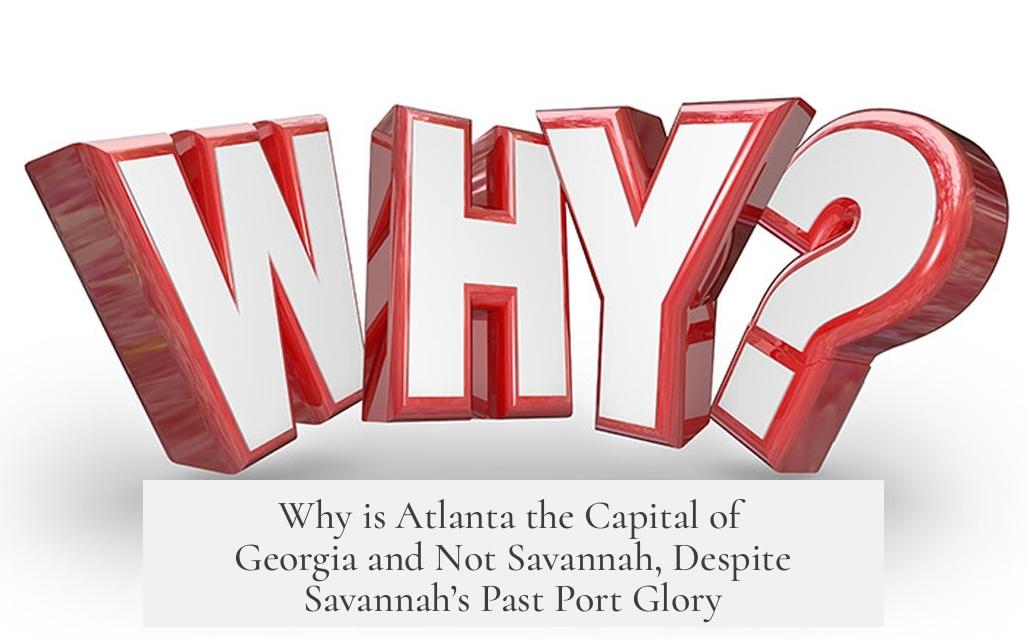Atlanta is the capital of Georgia instead of Savannah despite Savannah’s early role as the state’s port and commercial center because the capital location shifted westward over time, reflecting population movement and political changes, culminating in a military governor’s order in 1868 during Reconstruction that established Atlanta as the capital.
Initially, Savannah served as Georgia’s capital due to its importance as a port city on the Atlantic coast. However, many Georgians were unhappy with Savannah being the political center from the start. This dissatisfaction stemmed partly from geographical factors—most of Georgia’s population was moving inland and westward, away from the coastal areas where Savannah thrived.
During the American Revolution, Georgia’s capital moved frequently, reflecting both military pressures and the search for safer or more central locations. Temporary capitals included Augusta and Heard’s Fort, showing a clear pattern of shifting centers of power away from Savannah.
After the British evacuated, Georgia’s capital moved to Augusta and then to Louisville, a city built specifically to be a capital on the Oconee River. This decision aligned with the increasing population west of Savannah, emphasizing a desire to place the capital nearer to the growing inland settlements rather than the coastal hub.
Following Louisville, Milledgeville became the state capital in the early 19th century. However, by the 1840s and 1850s, dissatisfaction with Milledgeville grew. Some Georgians wanted to relocate the capital again to better serve the population’s new centers, particularly considering the rise of Atlanta.
Atlanta’s rise in the 1850s made it a strong candidate for the state capital. It rapidly outpaced other Georgia towns in economic growth and infrastructure, except in areas related to boat shipping, where Savannah still led. Atlanta’s location offered central access to railroads, which increasingly replaced river and port transport as key to economic development. This accessibility boosted Atlanta’s importance within the state.
Despite Atlanta’s growth, proposals to move the capital there faced opposition. Macon, situated more centrally in Georgia, argued it was better positioned for a state capital. This opposition delayed any formal move for some time.
The decisive change came in 1868 during Reconstruction, shortly after the Civil War. Georgia’s military governors ordered the capital relocated to Atlanta. This action was part of wider Union control measures in the South and was not driven solely by economic or geographic arguments. It represented a political shift connected to the Union’s attempt to reshape Southern governance and society.
Today, Atlanta remains Georgia’s capital, one of the lasting legacies of the Union occupation during Reconstruction. Its selection symbolizes broader historical currents beyond commerce and population geography, involving military governance and postwar political restructuring.
| Capital Location | Reason for Move | Time Period |
|---|---|---|
| Savannah | Original capital, port and commerce hub | Colonial period – American Revolution |
| Augusta, Heard’s Fort, temporary sites | Safety and wartime needs | American Revolution |
| Augusta, then Louisville | Population shift westward | Post-Revolution |
| Milledgeville | Near growing population centers | Early 19th century |
| Atlanta | Rapid growth, railroad access, military order | 1868 – Present |
This history reveals that economic prominence alone did not determine the capital’s location. Savannah’s role as a major port was crucial, yet demographic shifts toward the interior and strategic transport routes influenced capital relocations.
Military and political decisions during Reconstruction were ultimately decisive in designating Atlanta as the capital. Thus, the capital’s location reflects a combination of geography, population dynamics, and historical events rather than commercial status alone.
- Georgia’s capital moved from Savannah inland following population shifts westward.
- Multiple cities served as temporary or permanent capitals before Atlanta’s selection.
- Atlanta grew into an economic hub due to railroads despite Savannah’s port dominance.
- The 1868 military governor’s order officially made Atlanta the capital during Reconstruction.
- Atlanta’s capital status is linked to political control changes after the Civil War.
Why is Atlanta the Capital of Georgia and Not Savannah, Despite Savannah’s Past Port Glory?

Atlanta is the capital of Georgia because the state’s political center shifted westward following population growth patterns, combined with a strategic decision made by military governors during Reconstruction, rather than simply following where the port and commerce thrived. In other words, commerce couldn’t hold the capital in Savannah—politics, demographics, and history had other plans.
Let’s break down this fascinating journey from Savannah’s colonial prominence to Atlanta’s political dominance. Spoiler alert: It involves war, migration, and a dash of military orders.
The Colonial Capital: Why Savannah Isn’t the Capital Today
Savannah holds deep roots in Georgia’s history as the original capital. It was the first major city and main port, bustling with commerce and trade. One might think that a place thriving in commerce would naturally stay the political hub. Yet, right from the start, many Georgians weren’t thrilled with Savannah’s role as the capital.
Why? Well, Georgia’s geography was more than just a line along the coast. The population was spreading inland, westward across the state. Savannah’s location on the Atlantic coast made it less convenient for the majority. Imagine trying to run state affairs in a place hundreds of miles from where most citizens lived. Not great planning if you want everyone to feel included.
This disconnect sparked dissatisfaction and threatened Savannah’s political status. It’s like having a ping-pong tournament with players at opposite ends of the country—sure, it’s fun for the coast, but the inland players get a raw deal.
Flux in the Capital During Tumultuous Times
The American Revolution only added to this instability. During the war, Georgia’s capital was a moving target. Augusta, Heard’s Fort, and other places served as temporary seats of government. This fluidity mirrored the chaos of wartime but also highlighted how Georgia’s leadership struggled to settle on a fixed political center.
After the war, the capital bounced between Augusta and Louisville. These moves were no accident—each represented shifts following the growing population, which was pushing steadily west of Savannah. The busy port city was losing political clout as the state expanded.
Milledgeville: The In-Between Capital

By the early 19th century, Milledgeville became the capital, chosen for being more centrally located than Savannah. Despite this compromise, dissatisfaction lingered. Some Georgians soon thought, “Hey, maybe we can do better.” Calls grew for moving the capital once again—this time, motivated by the rise of a new contender: Atlanta.
Atlanta’s Meteoric Rise and Macon’s Opposition
By the 1850s, Atlanta wasn’t just a blip on the map. It was booming, surpassing other towns in population, railway connections, and infrastructure. However, shipping by boat remained a domain where Savannah held onto superiority. The state’s economy was diversifying inland, and Atlanta symbolized this new frontier.
Interestingly, not everyone cheered Atlanta’s ascent. Macon, another contender for the capital, argued it was more centrally located and should get the honor. They made their case loudly, rejecting Atlanta’s bid. This tug-of-war shows that placement of a capital involves more than just size or economy—regional pride and accessibility matter a lot.
The Final Blow: Military Governors and the Capital Switch
The official shift to Atlanta didn’t occur via a popular vote, negotiation, or commerce alone. It was a top-down decision imposed by Georgia’s military governors in 1868, during the Union occupation after the Civil War.
“Georgia’s military governors simply ordered the capital moved to Atlanta.”
This move was part of the Reconstruction effort, aiming to reshape Georgia’s political landscape. Atlanta became the symbol of renewal and the new South, echoing the post-war shift away from old coastal powers like Savannah. The fact that today’s capital location remains a relic of this era is a fascinating twist to the story.
What Does This Mean Today?

Atlanta’s rise as capital offers a perfect example of how geography, demographics, and history interact in state politics. It wasn’t just about ports or commerce. It was about moving the power base in step with where people lived, worked, and transported goods—mostly by rail, not boat.
Today, Atlanta thrives as Georgia’s largest city, a major metropolitan hub, and a center of political power. Its location helps it serve a sprawling population better than Savannah’s coastal outpost ever could.
Lessons from Georgia’s Capital Shuffle
- Geography and population matter: Capitals closer to where most residents live can serve them more effectively.
- Economic centers don’t always equal political centers: Savannah’s port was huge, but inland growth was key.
- Historical events shape decisions: The Civil War and Reconstruction played a direct role in Atlanta becoming capital.
- Opposition and politics are constant: Even after choosing Milledgeville and later Atlanta, there was pushback from other cities like Macon.
Would Savannah Make a Better Capital Today?
Good question! Savannah remains a historic gem and thriving port, but does it meet the diverse needs of today’s Georgia? Likely not as well as Atlanta. The capital requires access to the sprawling metro area, highways, airports, and political networks. Savannah’s coastal charm doesn’t solve the logistical challenge of governing a modern state with millions spread inland.
So, next time someone wonders why the capital is not where the commerce was busiest, remember: the answer blends history, shifting demographics, and yes… a little military decree. Politics is rarely dictated by economics alone.




